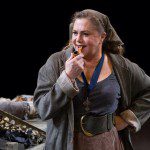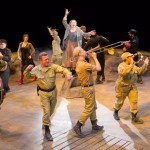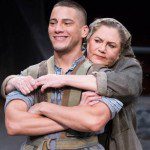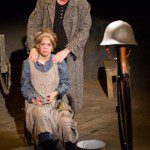With Turner, Arena’s Ambitious ‘Mother Courage’ Is Epic
By • February 28, 2014 0 1644
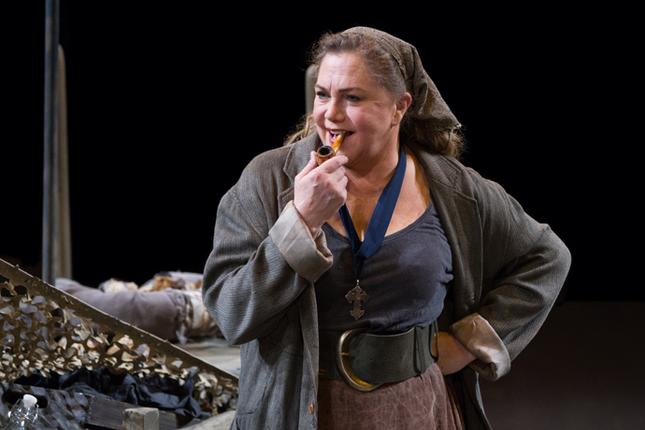
As Arena Stage Artistic Director Molly Smith reminds us, the play now at the Fichandler at Arena is called “Mother Courage and Her Children”—not just “Mother Courage,” as it sometimes is—implying that the character played in gruff operatic style by the great Kathleen Turner is motivated primarily by her maternal instincts.
That may be true, but there’s no solace for the audience or for Mother Courage in Bertolt Brecht’s astonishing epic, which the author of “The Three Penny Opera” and a host of almost tribal theatrical jeremiads against war, greed, militarism, big business and corporate interests began writing in 1938, on the eve of World War II, and only two decades after World War I, when “the war to end all wars” ended.
The play—hugely theatrical, casting a wide net—almost always has a way of looking both specific and humanly abstract. Certainly, that’s where Smith is going. She means to connect Mother Courage, her three children, a camp follower, a minister, a chef and sundry scoundrels, brutal soldiers, camp followers, and civilians from the Thirty Years’ War to the present and our own times and country with the presence of soldiers in present-day uniforms.
The suggestion that we’re always in some sort of Thirty Years War isn’t wrong, but given that we’ve conducted our winding-down and current war and most recent war in a way that our populations are disconnected from them in a way that the protagonists of this play are not, the idea is not as searing as it should be. The mix of present-day clothing and weaponry, not to mention contemporary colloquial profanity, does bring us closer to the characters that populate the Fichandler in-the-round stage, which looks like a bombed out-pit of debris from wars coming and going.
The problem with the ironically nick-named Mother Courage is that she tries to balance what she thinks is her astute business acumen with her love of her children. That acumen is mostly greed, driven by fear. She is fiercely neutral, without ideology, with a burning passion to save her children and her cart of goods, a kind of moving canteen that she and her children carry across the battlefields of central and western Europe. They skate just barely by, never sure, never safe, in a particularly savage war which ruined what was then Germany for decades.
Turner’s Mother Courage has a kind of gruff passion. She has verbal size and distinction. She knows the values of goods and her own shrewd self. She has the survivalist courage to take on whatever’s coming down the pike, which is always unexpected , unfair, unsavory, and unpleasant. She and her children—a big, tough strapping boy Eilife, played with a strong presence and even stronger voice by Nicholas Rodriguez, the vulnerable but numbers-wise boy she calls Swiss Cheese, played with pathos by Nehal Joshi, and Katatrin, solemn, quickly moving and silent, played with astonishingly loud silence by Erin Weaver—stagger across the muddy fields, cratered and shell-serenaded landscape like watchful wayfarers.
Mother Courage is a part that can be done with scurvy, sexy humor—or it can plain done in, without humor. Turner is, at turns, funny and calls on her gift for sexuality when it is appropriate but with ease, and the love for her kids—a really tough love—is nevertheless self evident. It seems to blind her when it’s hitched to her greed. She’s like a con man who thinks war is just another mark she can outwit.
As an experience, this production, which features gloriously thrift-shop costume designs by Joseph Salasovich and a spectacularly beat-up war set by Todd Rosenthal, is almost overwhelming. It’s like being parachuted into a place you’ve avoided all your life. It’s a dangerous place. It has the unkempt odor of religious passions which can turn murderous in a second. It’s full of loss and constant change—one day you’re a camp follower, the next day, you’re a colonel’s mistress, which is what happens to a Grisabella-like Yvette played with loud charm by Meg Gillentine.
The production also has the gifts of David Hare’s tough translation, which knows the different between honest colloquial grief and polemics, and new music composed by James Sugg. Turner sings in the key of knock-you-over, when she’s doing “Mother Courage’s Song” and straight from the torn heart with “Lullaby.” Rick Foucheux displays a fine, touching voice in “The God Who Was a Man” as well as putting on a display of complexity in his role as the chaplain. The music is presented like there’s a circus band of gypsies and jazz men following the proceedings.
In the end, of course, everything Mother Courage does puts her children in danger, and they fall or disappear one by one, as she nevertheless hangs on to her cart. Those last images remind you of any war, of Lear, of great, imagined losses. And when the production does that, why that’s a kind of courage in and of itself.
- Mother Courage and Her Children Kathleen Turner as Mother Courage in Mother Courage and Her Children at Arena Stage at the Mead Center for American Theater January 31-March 9, 2014 | Teresa Wood
- Ari Post
- Ari Post
- Ari Post
- Ari Post

